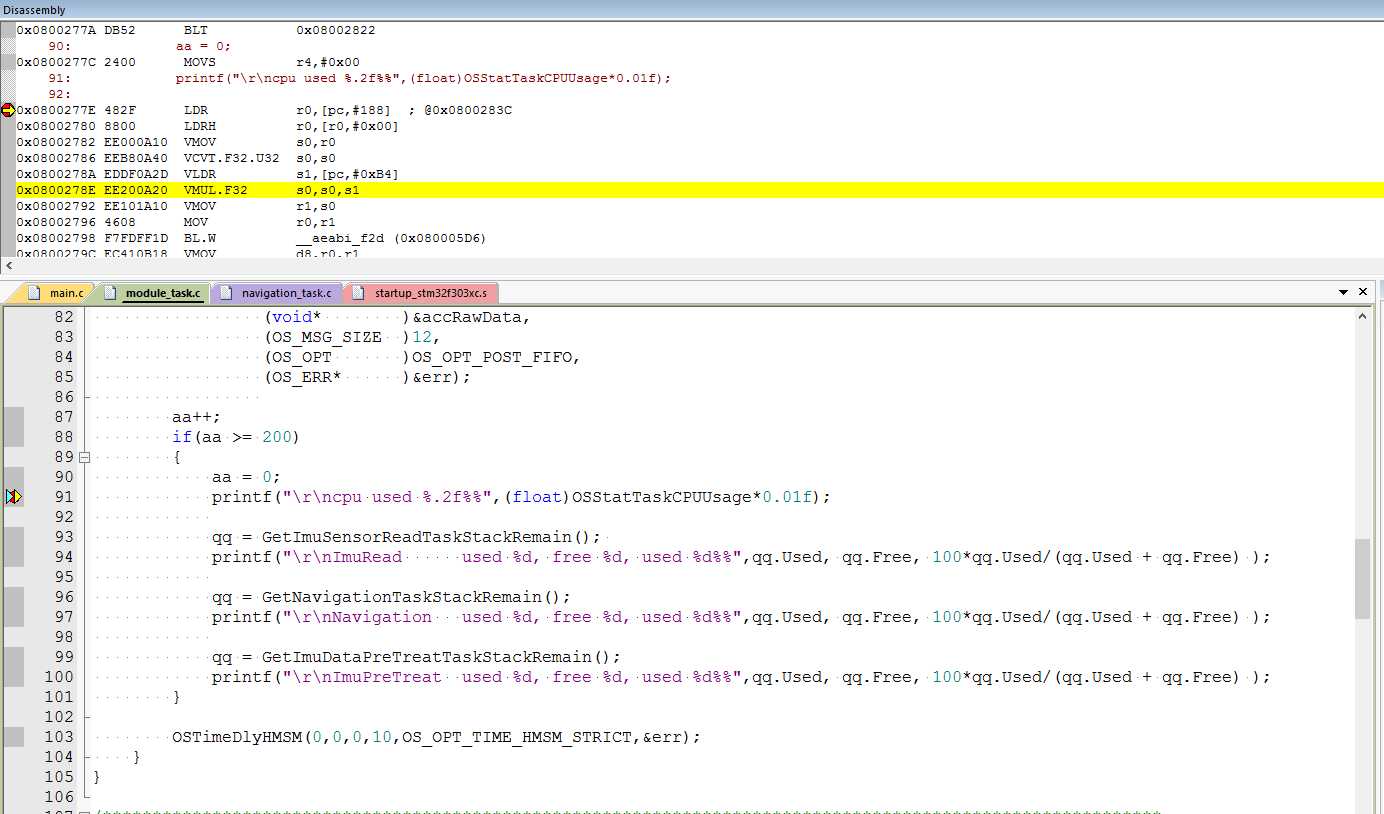STM32F303xC在UCOSIII下使用FPU总结
Posted sypspace
tags:
篇首语:本文由小常识网(cha138.com)小编为大家整理,主要介绍了STM32F303xC在UCOSIII下使用FPU总结相关的知识,希望对你有一定的参考价值。
总体来说,按照网上的教程差不多,但是有个别地方不太一样,下面分别说说。
1.打开单片机的FPU
在 system_stm32f30x.c 文件下找到函数 SystemInit ,注意头几行的条件判断(橙色)有没有,没有的话加上。
void SystemInit(void) { /* FPU settings ------------------------------------------------------------*/ #if (__FPU_PRESENT == 1) && (__FPU_USED == 1) SCB->CPACR |= ((3UL << 10*2)|(3UL << 11*2)); /* set CP10 and CP11 Full Access */ #endif /* Reset the RCC clock configuration to the default reset state ------------*/ /* Set HSION bit */ RCC->CR |= (uint32_t)0x00000001; /* Reset CFGR register */ RCC->CFGR &= 0xF87FC00C; /* Reset HSEON, CSSON and PLLON bits */ RCC->CR &= (uint32_t)0xFEF6FFFF; ... ... }
2.在 stm32f30x.h 文件中 找到 宏定义 __FPU_PRESENT 并置1
3.在 option for target -- C/C++ --Preoprocessor Symbols 加入__TARGET_FPU_VFP 和 __FPU_PRESENT ; 在 option for target --target -- code generation -- Float Point Hardware 选择 SIngle Precision
4.确保 core_cm4.h 中这里的条件编译 成功宏定义 __FPU_USED 为1
#if defined ( __CC_ARM ) #if defined __TARGET_FPU_VFP #if (__FPU_PRESENT == 1) #define __FPU_USED 1 #else #warning "Compiler generates FPU instructions for a device without an FPU (check __FPU_PRESENT)" #define __FPU_USED 0 #endif #else #define __FPU_USED 0 #endif
5.在 startup_stm32f303xc.s 文件中,添加橙色汇编代码以支持FPU,这部分代码,网络上有不同版本,正点原子也和我的不同,我是尝试了好多版本才试出来我这个是可以用的,具体原因不太清楚,以后再查吧。
; Reset handler Reset_Handler PROC EXPORT Reset_Handler [WEAK] IMPORT SystemInit IMPORT __main LDR R0, =0xE000ED88 ; 使能浮点运算 CP10,CP11 LDR R1,[R0] ORR R1,R1,#(0xF << 20) STR R1,[R0] DSB LDR.W R0,=0xE000EF34 LDR R1,[R0] AND R1,R1,#(0X3FFFFFFF) STR R1,[R0] ISB LDR R0, =SystemInit BLX R0 LDR R0, =__main BX R0 ENDP
ok!这样单片机这边的FPU就可以使用了,接下去在UCOSIII中开启FPU支持。
1.打开 os_cpu_c.c,找到函数 OSTaskStkInit,加入如下橙色代码
CPU_STK *OSTaskStkInit (OS_TASK_PTR p_task, void *p_arg, CPU_STK *p_stk_base, CPU_STK *p_stk_limit, CPU_STK_SIZE stk_size, OS_OPT opt) { CPU_STK *p_stk; (void)opt; /* Prevent compiler warning */ p_stk = &p_stk_base[stk_size]; /* Load stack pointer */ p_stk = (CPU_STK *)((CPU_STK)(p_stk) & 0xFFFFFFF8); /* Align the stack to 8-bytes. */ #if (__FPU_PRESENT==1)&&(__FPU_USED==1) /* Registers stacked as if auto-saved on exception */ *(--p_stk) = (CPU_STK)0x00000000u; //No Name Register *(--p_stk) = (CPU_STK)0x00001000u; //FPSCR *(--p_stk) = (CPU_STK)0x00000015u; //s15 *(--p_stk) = (CPU_STK)0x00000014u; //s14 *(--p_stk) = (CPU_STK)0x00000013u; //s13 *(--p_stk) = (CPU_STK)0x00000012u; //s12 *(--p_stk) = (CPU_STK)0x00000011u; //s11 *(--p_stk) = (CPU_STK)0x00000010u; //s10 *(--p_stk) = (CPU_STK)0x00000009u; //s9 *(--p_stk) = (CPU_STK)0x00000008u; //s8 *(--p_stk) = (CPU_STK)0x00000007u; //s7 *(--p_stk) = (CPU_STK)0x00000006u; //s6 *(--p_stk) = (CPU_STK)0x00000005u; //s5 *(--p_stk) = (CPU_STK)0x00000004u; //s4 *(--p_stk) = (CPU_STK)0x00000003u; //s3 *(--p_stk) = (CPU_STK)0x00000002u; //s2 *(--p_stk) = (CPU_STK)0x00000001u; //s1 *(--p_stk) = (CPU_STK)0x00000000u; //s0 #endif *(--p_stk) = (CPU_STK)0x01000000u; /* xPSR */ *(--p_stk) = (CPU_STK)p_task; /* Entry Point */ *(--p_stk) = (CPU_STK)OS_TaskReturn; /* R14 (LR) */ *(--p_stk) = (CPU_STK)0x12121212u; /* R12 */ *(--p_stk) = (CPU_STK)0x03030303u; /* R3 */ *(--p_stk) = (CPU_STK)0x02020202u; /* R2 */ *(--p_stk) = (CPU_STK)p_stk_limit; /* R1 */ *(--p_stk) = (CPU_STK)p_arg; /* R0 : argument */ #if (__FPU_PRESENT==1)&&(__FPU_USED==1) *(--p_stk) = (CPU_STK)0x00000031u; //s31 *(--p_stk) = (CPU_STK)0x00000030u; //s30 *(--p_stk) = (CPU_STK)0x00000029u; //s29 *(--p_stk) = (CPU_STK)0x00000028u; //s28 *(--p_stk) = (CPU_STK)0x00000027u; //s27 *(--p_stk) = (CPU_STK)0x00000026u; //s26 *(--p_stk) = (CPU_STK)0x00000025u; //s25 *(--p_stk) = (CPU_STK)0x00000024u; //s24 *(--p_stk) = (CPU_STK)0x00000023u; //s23 *(--p_stk) = (CPU_STK)0x00000022u; //s22 *(--p_stk) = (CPU_STK)0x00000021u; //s21 *(--p_stk) = (CPU_STK)0x00000020u; //s20 *(--p_stk) = (CPU_STK)0x00000019u; //s19 *(--p_stk) = (CPU_STK)0x00000018u; //s18 *(--p_stk) = (CPU_STK)0x00000017u; //s17 *(--p_stk) = (CPU_STK)0x00000016u; //s16 #endif /* Remaining registers saved on process stack */ *(--p_stk) = (CPU_STK)0x11111111u; /* R11 */ *(--p_stk) = (CPU_STK)0x10101010u; /* R10 */ *(--p_stk) = (CPU_STK)0x09090909u; /* R9 */ *(--p_stk) = (CPU_STK)0x08080808u; /* R8 */ *(--p_stk) = (CPU_STK)0x07070707u; /* R7 */ *(--p_stk) = (CPU_STK)0x06060606u; /* R6 */ *(--p_stk) = (CPU_STK)0x05050505u; /* R5 */ *(--p_stk) = (CPU_STK)0x04040404u; /* R4 */ return (p_stk); }
2.打开 os_cpu_a.asm ,将橙色部分取消注释。这部分代码网上也有不同版本,我也是试了好几种才试出来这个可以用,具体以后再查吧。
PendSV_Handler CPSID I ; Prevent interruption during context switch MRS R0, PSP ; PSP is process stack pointer CBZ R0, PendSVHandler_nosave ; Skip register save the first time ;Is the task using the FPU context? If so, push high vfp registers. SUBS R0, R0, #0x40 VSTM R0, {S16-S31} SUBS R0, R0, #0x20 ; Save remaining regs r4-11 on process stack STM R0, {R4-R11} LDR R1, =OSTCBCurPtr ; OSTCBCurPtr->OSTCBStkPtr = SP; LDR R1, [R1] STR R0, [R1] ; R0 is SP of process being switched out ; At this point, entire context of process has been saved PendSVHandler_nosave PUSH {R14} ; Save LR exc_return value LDR R0, =OSTaskSwHook ; OSTaskSwHook(); BLX R0 POP {R14} LDR R0, =OSPrioCur ; OSPrioCur = OSPrioHighRdy; LDR R1, =OSPrioHighRdy LDRB R2, [R1] STRB R2, [R0] LDR R0, =OSTCBCurPtr ; OSTCBCurPtr = OSTCBHighRdyPtr; LDR R1, =OSTCBHighRdyPtr LDR R2, [R1] STR R2, [R0] LDR R0, [R2] ; R0 is new process SP; SP = OSTCBHighRdyPtr->StkPtr; LDM R0, {R4-R11} ; Restore r4-11 from new process stack ADDS R0, R0, #0x20 ;Is the task using the FPU context? If so, push high vfp registers. VLDM R0, {S16-S31} ADDS R0, R0, #0x40 MSR PSP, R0 ; Load PSP with new process SP ORR LR, LR, #0x04 ; Ensure exception return uses process stack CPSIE I BX LR ; Exception return will restore remaining context END
现在,调试一下,看汇编窗口,乘法是带V开头的汇编指令,这样,就完成了!!!

以上是关于STM32F303xC在UCOSIII下使用FPU总结的主要内容,如果未能解决你的问题,请参考以下文章